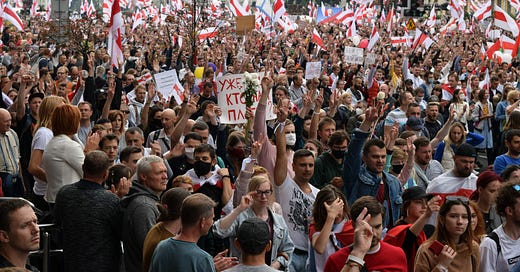Listen* to my interview with Paul Hansbury for New Books in European Politics about his Belarus in Crisis: From Domestic Unrest to the Russia–Ukraine War (Hurst, 2023) on Apple or Spotify.
[*Apologies in advance that I recorded myself too loud. Despite the valiant efforts of the ever-patient Marshall Poe, my voice is slightly distorted at the beginning. Fortunately, it improves and - as you’d be entitled to expect - Paul Hansbury does most of the talking.]
The war in Ukraine is entering what could well be its decisive phase as Kyiv prepares a counter-offensive and Russia announces plans to deploy tactical nuclear weapons into Belarus as early as the summer. More than ever before, this moves Belarus onto the front line of Russia's invasion of Ukraine and its confrontation with NATO.
Yet, for three decades, president-for-life Alexander Lukashenka has tried to walk a tightrope between hugging Moscow close and clinging to policy independence that is domestically popular and secures power for his family and friends. His increasing economic dependence and the war to his south have forced “Europe’s last dictator” to pick a side.
In his new book, Paul Hansbury explains why Lukashenka had no choice but to buckle. He writes that "a 'quiet' annexation of Belarus to Russia is largely happening, even if many Belarusians are unaware of the fact" and “the outcome of the Russo-Ukraine war has arguably become the decisive factor shaping Berlarus's future statehood”. Educated at Birkbeck, University of London, and St Antony's College Oxford, Paul is a consulting analyst whose doctoral research was into the foreign policies of small powers - using Belarus as his primary case study.
For my Writer's Writers tip sheet, he chose Putin's Kleptocracy: Who Owns Russia? by Karen Dawisha (Simon & Schuster, 2014) and Nostromo: A Tale of the Seaboard by Joseph Conrad (Penguin Classics, 2007 - first published 1904).





